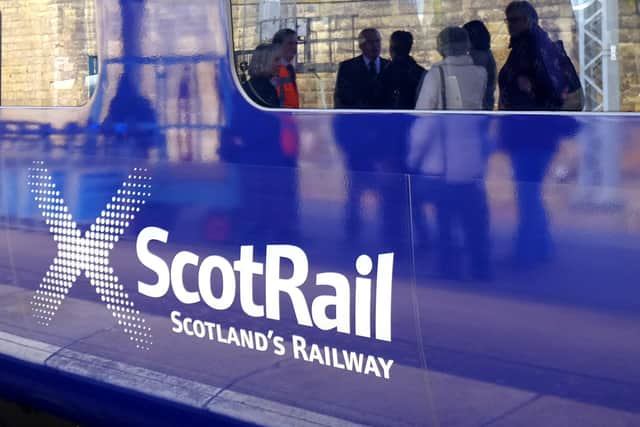Alcohol ban on ScotRail trains introduced despite police preference for relaxation of Covid rules
Police preferred a return to a more relaxed approach to alcohol on Scotland’s rail network, but were ignored when a total ban was kept by the Scottish Government, it can be revealed.
The total ban on alcohol consumption on ScotRail trains was introduced in July 2020 to “support Covid-19 mitigations and measures”, increasing a ban that had outlawed drinking on trains between 9pm and 10am.
Advertisement
Hide AdAdvertisement
Hide AdThe Scotsman revealed last summer that ScotRail chiefs had opposed the continuation of the ban. It can now be revealed the British Transport Police (BTP) and Transport Scotland officials also opposed the continuation of the full ban, before being overruled by the-then transport minister Jenny Gilruth.


ScotRail banned the drinking of alcohol after 9pm in 2012 on trains and in stations and extended it round the clock in 2020. Visible alcohol, even unopened, is also forbidden and must be kept out of sight in bags.
Earlier this year, Transport Scotland recommended higher fines for drinkers as part of a bid to improve the experience of women and girls on public transport.
The report said alcohol and drugs “featured in a lot of the descriptions of incidents that had or would make women feel unsafe” and “were seen to fuel much of the inappropriate behaviour that women and girls were exposed to and caused anxiety due to how unpredictable others became as a result”.
The BTP, whose involvement was previously redacted and kept secret, told ministers it was relaxed about the options, but said the “most use/benefit” would see a return to the pre-pandemic ban.
Previously unreleased extracts of emails disclosed to The Scotsman state: “None of the options would present BTP difficulty. However, in terms of preference, I would think, that if managed properly, with the right levels of discretion, Option 3 [a return to the pre-pandemic ban] would be of most use/benefit to the industry.”
An unidentified Transport Scotland official from the Rail Directorate also backed ‘option 3’, which would include an extension of the ban to lines which suffer from anti-social and criminal behaviour.
They state this option “looks like the most appropriate”.
The continuation of the ban is being considered as part of the Scottish Government’s national ‘conversation’ on rail services, but there is no sign of it being relaxed in the near future.
Advertisement
Hide AdAdvertisement
Hide AdScottish Conservative transport spokesperson Graham Simpson said passengers deserved a “resolution as soon as possible”.
He said: “This shows that, like the public, British Transport Police, Transport Scotland and ScotRail all thought this supposedly temporary measure, introduced during the pandemic, could be relaxed.
“Their preferred option was to allow specific alcohol bans to prevent potentially disruptive or anti-social behaviour, not to impose restrictions on normal catering services. The Scottish Government’s refusal to make a clear decision has led to the worst of all worlds. Passengers face restrictions on what’s already a substandard service, but no one is enforcing the rules when they are flouted.”
Scottish Liberal Democrat transport spokesperson Jill Reilly said: “This seems to be yet another case of the SNP Government failing to work productively with those at the frontline of a public service.”
A Transport Scotland spokesperson said any reintroduction of the pre-pandemic ban and a relaxation on the rules around alcohol could only happen “at the right time and in the right circumstances”.
They said: “While the alcohol ban on trains remains in place, it is kept under review taking cognisance of not only transport policy, but also the views of colleagues in justice and in health.”
Comments
Want to join the conversation? Please or to comment on this article.
